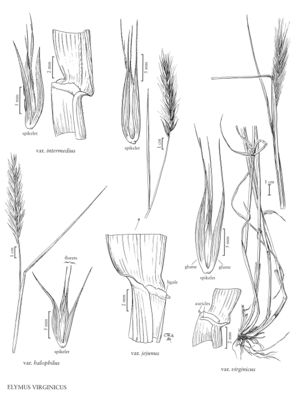Difference between revisions of "Elymus virginicus var. intermedius"
FNA>Volume Importer |
FNA>Volume Importer |
||
| Line 21: | Line 21: | ||
-->{{Treatment/Body | -->{{Treatment/Body | ||
| − | |discussion=<p | + | |discussion=<p>Elymus virginicus var. intermedius grows in moist, base-rich soil in open forests and thickets, especially on rocky, gravelly, or sandy banks of larger streams. It grows from the central and southern Great Plains, through the central Mississippi and Ohio valleys, to the northeastern United States and adjacent Canada, but is rare to absent south of Oklahoma to Tennessee and to Maryland.</p> |
|tables= | |tables= | ||
|references= | |references= | ||
| Line 37: | Line 37: | ||
|basionyms= | |basionyms= | ||
|family=Poaceae | |family=Poaceae | ||
| + | |illustrator=Cindy Roché and Annaliese Miller | ||
|reference=None | |reference=None | ||
|publication title= | |publication title= | ||
|publication year= | |publication year= | ||
|special status= | |special status= | ||
| − | |source xml=https:// | + | |source xml=https://bibilujan@bitbucket.org/aafc-mbb/fna-data-curation.git/src/314eb390f968962f596ae85f506b4b3db8683b1b/coarse_grained_fna_xml/V24/V24_420.xml |
|subfamily=Poaceae subfam. Pooideae | |subfamily=Poaceae subfam. Pooideae | ||
|tribe=Poaceae tribe Triticeae | |tribe=Poaceae tribe Triticeae | ||
Revision as of 16:07, 30 October 2019
Plants often partly glaucous, becoming yellowish, reddish, or slightly purplish brown at maturity. Culms usually 60-120 cm; nodes usually 4-8, concealed or exposed; auricles and ligules usually poorly developed. Blades 4-18 mm wide, lax or involute, glabrous, scabridulous, or occasionally pubescent. Spikes 6-22 cm long, sheathed or exserted; spikelets hispidulous to villous-hirsute, usually glaucous; glumes 0.8-1.2(2) mm wide, indurate and bowed out in the basal 2-4 mm. Anthesis early July to mid-August.
Discussion
Elymus virginicus var. intermedius grows in moist, base-rich soil in open forests and thickets, especially on rocky, gravelly, or sandy banks of larger streams. It grows from the central and southern Great Plains, through the central Mississippi and Ohio valleys, to the northeastern United States and adjacent Canada, but is rare to absent south of Oklahoma to Tennessee and to Maryland.
Selected References
None.
